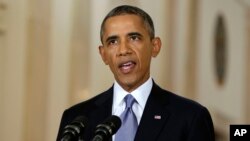THE WHITE HOUSE —
President Barack Obama has welcomed the framework of a deal, reached by the United States and Russia, to rid Syria of chemical weapons. The president's reaction came in a written statement Saturday.
In the statement, Obama said he welcomed the progress made between the U.S. and Russia in negotiations in Geneva that produced a framework agreement Saturday. He called it “an important, concrete step toward the goal of moving Syria’s chemical weapons under international control.”
The president said much more work remained to be done, however. He said the U.S. would “continue working with Russia, the United Kingdom, France, the United Nations and others to ensure that this process is verifiable, and that there are consequences” if the government of Syrian President Bashar al-Assad did not comply with the deal.
However, Russia would likely veto any U.N. military action.
Obama said that if diplomacy failed, military action was still possible.
In his weekly radio and Internet address, recorded Friday before the deal was reached, the president said, in that case, force would still be an option.
“And since this plan emerged only with a credible threat of U.S. military action, we will maintain our military posture in the region, to keep the pressure on the Assad regime. And if diplomacy fails, the United States and the international community must remain prepared to act,” he said.
In that address, Obama also said it was important that diplomatic efforts succeed, to make it clear that the world will not tolerate the use of chemical weapons.
“We have a duty to preserve a world free from the fear of chemical weapons for our children. But if there is any chance of achieving that goal without resorting to force, then I believe we have a responsibility to pursue that path,” he said.
Watch President Obama's weekly address:
President Obama was briefed on the agreement Saturday by his national security adviser, Susan Rice and U.N. Ambassador Samantha Power.
The president also called Secretary of State John Kerry to be briefed on the talks, and to congratulate Kerry for reaching the agreement with Russian Foreign Minister Sergei Lavrov.
The deal could avert U.S. military strikes in retaliation for last month’s chemical weapons attack in Syria, which is believed to have killed more than 1,400 people.
The prospect of U.S. airstrikes on Syria is deeply unpopular with the American people, and any authorization to launch an attack was far from certain to be approved in Congress.
In the statement, Obama said he welcomed the progress made between the U.S. and Russia in negotiations in Geneva that produced a framework agreement Saturday. He called it “an important, concrete step toward the goal of moving Syria’s chemical weapons under international control.”
A Look at Key Points of US-Russia Plan for Syria
Key points of US-Russian proposal for eliminating Syria's chemical weapons- A full declaration from Syria of chemical weapons storage and production sites in one week
- Initial on-site inspections of sites by November
- Destruction of chemical mixing, production and filling equipment by November
- Elimination or removal of chemical weapons material and equipment by mid-2014
- Syrian violations could prompt U.N. Security Council action
However, Russia would likely veto any U.N. military action.
Obama said that if diplomacy failed, military action was still possible.
In his weekly radio and Internet address, recorded Friday before the deal was reached, the president said, in that case, force would still be an option.
“And since this plan emerged only with a credible threat of U.S. military action, we will maintain our military posture in the region, to keep the pressure on the Assad regime. And if diplomacy fails, the United States and the international community must remain prepared to act,” he said.
In that address, Obama also said it was important that diplomatic efforts succeed, to make it clear that the world will not tolerate the use of chemical weapons.
“We have a duty to preserve a world free from the fear of chemical weapons for our children. But if there is any chance of achieving that goal without resorting to force, then I believe we have a responsibility to pursue that path,” he said.
Watch President Obama's weekly address:
President Obama was briefed on the agreement Saturday by his national security adviser, Susan Rice and U.N. Ambassador Samantha Power.
The president also called Secretary of State John Kerry to be briefed on the talks, and to congratulate Kerry for reaching the agreement with Russian Foreign Minister Sergei Lavrov.
The deal could avert U.S. military strikes in retaliation for last month’s chemical weapons attack in Syria, which is believed to have killed more than 1,400 people.
The prospect of U.S. airstrikes on Syria is deeply unpopular with the American people, and any authorization to launch an attack was far from certain to be approved in Congress.




